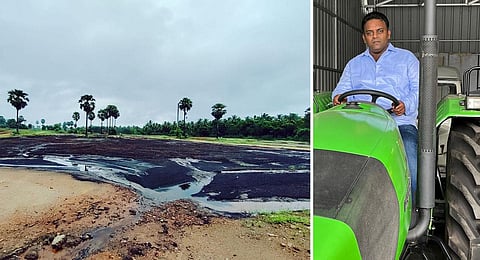

CHENNAI: One should not just make hay while the sun shines, but also ensure the land that nourished the hay remains fertile for the future too. Meet 38-year-old G Saravanamoorthi from Pollachi who quit a high-paying techie job with the Bank of New York in the United States, and invented a path-breaking green automation system for coir pith processing.
As per official statistics, there are around 5,000 coir industries in Tamil Nadu, of which 1,750 are in Pollachi. TNIE recently visited the region and found hundreds of acres of coconut farms being leased out by farmers to industries for setting up coir pith yards. The industries tap ground water and sometimes even lift fresh water from irrigation canals or rivers for washing the pith and reducing its electrical conductivity (salinity content) value. Multiple studies have confirmed that farms used as pith yards, turn infertile and the damage is almost irreversible owing to increase in soil salinity and groundwater depletion.
However, countries across the globe are considering soil-less agriculture practices, for instance, farmers in Japan now use processed coir pith as primary soil in fields. So, about coir pith processing in Tamil Nadu, there are challenges concerning the land, as well as astounding business opportunities.
When Saravanamoorthi returned from the US in 2011, he too wanted to establish a coir industry. “However, my father dissuaded me and asked me to first conceive a solution for processing pith without marring the land and water resources. After extensive research and multiple visits to Sri Lanka, which is a big player in coir pith exports, I designed the final prototype of ‘Pure Eniv’, the automation system in 2021. An Italian company has expressed desire to set up a coir unit in Pollachi using my technology. Likewise, the Coconut Development Authority in Sri Lanka had also expressed interest in my technology, but the pandemic derailed the whole operation."
He claims that his machine is eco-friendly and can process five tonnes of coir pith in a single day with just half the quantity of water used in the conventional process, and has a zero liquid discharge system. “Over 20 litres of water are needed to wash 1 kg of pith in the conventional process, while ‘Pure Eniv’ would require only eight litres. This apart, the industries would no longer need to have acres of coir pith yards for washing. Just a small piece of land to stock and sun-dry the produce is enough," Saravanamoorthi told TNIE.
The body of Pure Eniv machine, for which a US patent will be sought soon, is made up of special sub-marine grade alloy, which makes it an anti-corrosive and all-weather machine. "It also comes with a 'plug & play' mechanism which makes it versatile and user-friendly."
In 2021, the Tamil Nadu Pollution Control Board (TNPCB) changed the category of all coir units from 'white' to 'orange' considering the environmental concerns, but associations of coir industries moved the Madras High Court and obtained a 'status quo'. In Kerala, they are red category industries.
An activist told TNIE that since Kerala has implemented stringent norms regarding coir pith processing, many people from the state have opened units in neighbouring Pollachi. “A coconut husk has 40% fibre and 60% pith. All the polluting processes like defibering and pith buffering are carried out in Pollachi, and manufacturing of value-added products like mats, yarn, coir rugs, and geotextile, is completed in Kerala,” he added. In this situation, the business potential and possibilities of environmental sustenance the Pure Eniv promises for Tamil Nadu must not be ignored at any cost.
BOXES:
What is coir pith?
1. Coir pith is the waste from coconut husk after removing the long fibres
2. It holds water well and holds more air than soil. It can be used three times with less loss of yield
3. It contains high EC or salinity. So, it is washed, heat-treated, screened, and graded which is then used for horticultural and agricultural applications and as industrial absorbent
3. Shipped in the form of compressed bales, briquettes, slabs, or discs
Conventional manufacturing practice:
1. Coir pith manufacturing is usually manual, time consuming, involves high human resource, requires large area of land for deposition and uses high volume of water
Environmental concerns:
1. Large area of farm lands is turned into processing or stock yards for coir pith
2. Farm lands converted to pith processing cannot be reversed for agriculture eventually due to land getting polluted and becoming infertile
3. Very high volume of water is consumed for processing and the drained water after washing affects the soil and plants
4. Yield of the surrounding land is affected due to spread of pollution by water (percolation into soil and ground water streams) and by spreading of loose pith (unwashed high EC pith) by air
5. Soil EC is increased making the land non cultivable
How our Pure Eniv helps:
1. The automation system converts high EC pith to low or zero EC within a day compared to the 40-day period in conventional processes
2. Pollution free working environment
3. Input water can be re-used
4. Rejection water from treatment plant has EC of range 0.6~0.9 mS/cm, which is harmless to the plants
How it works?
1. The parameters like water flow rate, pith flow rate, pre-moisture control, pre-EC of pith, processing medium TDS levels etc are iterated for different ratios to attain efficient processing results
2. The ratio will be dynamically updated, based on specially developed self-generating computerised program module